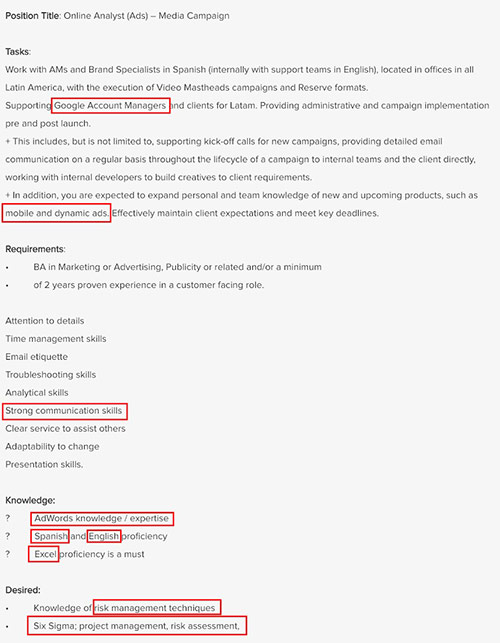Words can be both powerful and compelling. But knowing which words to use and how to use them within your resume and cover letter is a handy skill that must never be underestimated.
Using the right words in their proper context can help to demonstrate your skills and strengths as a potential job candidate and future employee. But what kind of lingo you should choose to make your application truly shine?
Below are 7 groups of resume power words (with examples) that you should consider using when writing your resume.
Find The Best Keywords For Your Resume First
When you send in your resume and cover letter to apply for a position, the employer or HR staff will often be faced with a high number of applications to sift through. This can be quite a laborious task for anyone, let alone a professional, so to make the selection process quicker, your resume will be quickly scanned over. Many large companies use electronic scanning equipment (ATS equipment) to quickly process many hundreds of resumes that regularly come flooding in. Smaller companies may do this by hand using staff, but both real humans and electronic resume scanners will be looking for the same thing – keywords!
Your first task in a successful job application is to get past the initial scanning and selection process. You do this by including relevant keywords that directly relate to the position you are applying for. You can easily find these powerful keywords and action verbs within the job description itself and any accompanying extra information that is given out when requesting more information from the employer about the role on offer.

Source: Cognizant Careers
Weaving skills and phrases used by the employer to describe the idea candidate into your cover letter and resume will greatly increase the chances of your application getting past the initial scanning stage.
How to Identify Keywords and Choose Keywords for Your Resume
Optimizing your resume around certain keywords to beat the scanning software is relatively simple. You just need to follow several quick rules:
Choose specific keywords. Most ATS software is designed to capture only exact match keywords. For instance, if it was programmed to pull applications with the word “e-commerce”, it will pass on resumes that include “eCommerce” or “Ecommerce”. Hence, you should tailor the texts of your resume to 100% match the job description text. Meaning you should copy abbreviations, numbers, plurals etc. as the employer writes them. For instance, mind if they write “three years of experience” or “3+ years of experience”. Yes, tweaking your wording for each application can be somewhat daunting, but dispatching a generic resume will not get you close to landing a job either.
Focus on hard skills. The goal of the ATS is to line up candidates with the closest-matching skill sets primarily. So you’ll want to place your hard skills in the limelight, and perhaps speak more to your soft skills in the cover letter. Your best bet is to list up your technical skills, tools/software that is used in your industry, credentials, certifications and full position titles.
For instance, here are some ideas from a customer service resume example our consultant has prepared:
- Tools/Software: Blazedesk, C-Desk, Customer Support Hardware, LiveChat, Microsoft Office Suite, Excel, Outlook, Zendesk, JIRA.
- Certifications: CCSP® Certified, CSIA Certified Customer Service Manager, Advanced, HDI Desktop Support Manager.
- Position titles: Telecom Support Center Team Lead, LiveChat Customer Service Agent.
Once your resume has successfully passed the first stage, your application will then go on to be looked at more closely. This is where employers or HR staff will actually take the time to read your resume and then either put you into the YES pile for short-listing for interview or put into the NO pile for rejection.
This is the stage where using more powerful and compelling words comes into play.
Why Use Power Words At All?
You may be asking why you would need to use more powerful words to catch the eye of the employer when you have already gotten past the scanning process. Surely you can let your personality shine through from your resume now it is being read by a human?
Firstly, at this stage employers will still be screening lots of applicants, so now you have to use some powerful words that jump off your page and quickly show the reader that you have the skills and the right qualifications for the job.
PRO TIP:
Using action words is an easy way to draw a recruiter’s attention. For example, “Responsible for developing and executing a social media strategy” does not give the same impression as “Managed all social media accounts.

Mary Ford
Career Coach
Californial, United States
Secondly, because reading through dozens of resumes can often become boring and repetitive, especially if the same language is used throughout each and every one of them, you need to make your application stand out from the crowd.
What Sort Of Powerful Words Should I Use?
Different words can convey different feelings and impressions. But you don’t need to have “copywriter” in your title, to master the art of picking the right lingo from the dictionary to describe why you are the best candidate for the job.
In fact, effective writing is often more science than art. Therefore, if you remember several proven formulas, you can craft a stellar job application on command in under an hour. And then scale it into 5X more personalized copies for each employer.
Your rule number one is this – use plenty of action verbs in your resume. They help describe the skills you possess, the tasks you’ve performed in the workplace and the great things you have accomplished.
For convenience, you’ll find a big list of resume action verbs below, based around certain subjects.
Leadership Action Verbs for Your Resume
- advised
- approved
- assigned
- authorized
- coached
- conceptualized
- controlled
- coordinated
- cultivated
- delegated
- directed
- employed
- enabled
- encouraged
- executed
- facilitated
- founded
- hired
- influenced
- instructed
- interviewed
- led
- mentored
- motivated
- produced
- recruited
- supervised
- trained
Decision-makers love to see leaders and self-confident candidates. But you don’t have to explicitly add “leader” to your profile (that’s something HRs don’t really like). It’s more of a “show, don’t tell” writing technique you should be using. Let your job duties, achievements and work experiences show off your leadership potential.
PRO TIP:
Use powerful words to describe yourself and your responsibilities, such as ‘Innovative’ as this would demonstrate your ability to generate new approaches to problems. Another example is ‘Adaptable’ as this would indicate that you are not rigid and are able to cope effectively with complexity and change.

Melony Botha
HR Consultant
London, United Kingdom
Use the leadership power words to describe your day-to-day duties, and don’t forget to quantify those with relevant numbers whenever possible. Example:
“Administered $45,000 in monthly digital advertising budgets. Coordinated the work of 4 junior managers, supervised timely campaigns execution and monitored key KPIs.”
Problem Solving Action Verbs for Your Resume
- altered
- augmented
- counseled
- corrected
- customized
- debugged
- decreased
- eased
- extended
- finalized
- fixed
- fulfilled
- generated
- invented
- procured
- reduced
- reconciled
- refined
- reformed
- remedied
- repaired
- retrieved
- restored
- retrieved
- settled
- solved
- strengthened
- supplemented
- transformed
So you know how to handle things and resolve issues before they lead to a full-blown crisis. Great, now show that to the potential decision-makers by describing exactly what kind of things you’ve managed to remedy at your past positions. For instance, if you were a receptionist, you could add the following power statement to your resume:
“Reconciled the company’s contact books, upgraded and digitized all the records. Developed a remodeled client booking process to the Senior Account Manager that was accepted and implemented, reducing time-per-booking by 3 minutes for the customers”.
Communication Action Verbs for Your Resume
- addressed
- authored
- briefed
- campaigned
- clarified
- composed
- convinced
- corresponded
- drafted
- edited
- explained
- Informed
- interpreted
- Marketed
- negotiated
- penned
- persuaded
- presented
- promoted
- publicized
- reported
- summarized
- translated
Position yourself as an eloquent communicator before you are even given a chance to speak with the HR team by using the power words from the listed above.
Organizations incredibly value good communicators. To highlight the achievements your great communication skills caused and give a primer of what it would be like to interact with you in person. Several quick examples:
- Management: Negotiated an exclusive 15% discount with a key supplier.
- Healthcare: Co-authored an improved treatment protocol for the clinic that resulted in 13% fewer readmissions.
- Education: Personally corresponded with 5 parents of problematic students and clarified how they should approach homework help.
Analytical Power Words for Your Resume
- analyzed
- audited
- checked
- compared
- concluded
- confirmed
- determined
- diagnosed
- estimated
- evaluated
- examined
- explored
- forecasted
- formulated
- integrated
- investigated
- justified
- mapped
- measured
- prioritized
- projected
- quantified
- recommended
- researched
- studied
- validated
- verified
If the job posting call for someone with strong analytical and research skills, be sure to use the proposed power words when crafting your resume.
But instead of just describing the type of analytical problems you’ve solved and the research you did, outline the effect your actions had. For example:
“Concluded a 3-month study of the company’s sales process efficiency and formulated a detailed roadmap for improvements. As a result, the company’s average time-to-reply to a new lead reduced from 3.5 hours to 35 minutes.”
Mirroring Language
Just about every company has its own internal language. Look out for favorite phrases and keywords that describe company values, company ethos and how they see themselves and describe themselves to others. Try not to look as if you are a mimic and you are simply borrowing their words for your resume. Instead, focus on one or two main keywords that you pick up and use these powerful words to weave naturally into your own text.
PRO TIP:
Take time to study the company’s website and the job description before you prepare your resume and cover letter. Be sure to include words that reflect the company culture. Also, choose power words that reflect the skills and assets you bring to the organization that will set you apart from the competition.

Brenda S. Meyer
Certified Senior HR Consultant
Arizona, United States
Transferable Skill Words
No matter what business sector you wish to work in, there will always be a degree of transferable skills that you can take with you from job to job. These skills are an important part of any role and employers are reassured when they spot them in a resume. All employers want an employee that is responsible, dedicated, can take the initiative and lead others, so always try to fit these powerful words into your resume.
Industry Specific Words
Using industry related words not only demonstrates that you have the desired hard skills and understanding needed to be able to do the job, but using key buzzwords and language shows that you also keep up to date with the latest innovations. It can show your employer that you are keen to learn new things and implement them in the workplace to achieve better results.
Always make sure that you completely understand any industry related jargon that you use on your resume. You may get questioned on this at the interview, and if you don’t really know what you are talking about, it will show that you are not qualified for the position.
This post has been originally published on Oct 23, 2017 and has been extensively revised and updated on July 8, 2019.







Fantastic article that helped me develop a resume for a career switch. Thanks!
Thank you for your kind words and feedback Zeth, I’m glad it helped!
brilliant work & choicest of words! I already feel much confident in drafting my resume for propelling my career in a streamlined way.
We’re super glad to hear that Namrata, this is the exact purpose of this article!
Thank you for your kind feedback ; )
This article was very helpful! I really appreciate the work and effort done by everyone involved in writing it.
Thanks for the feedback Rami, glad it helped!